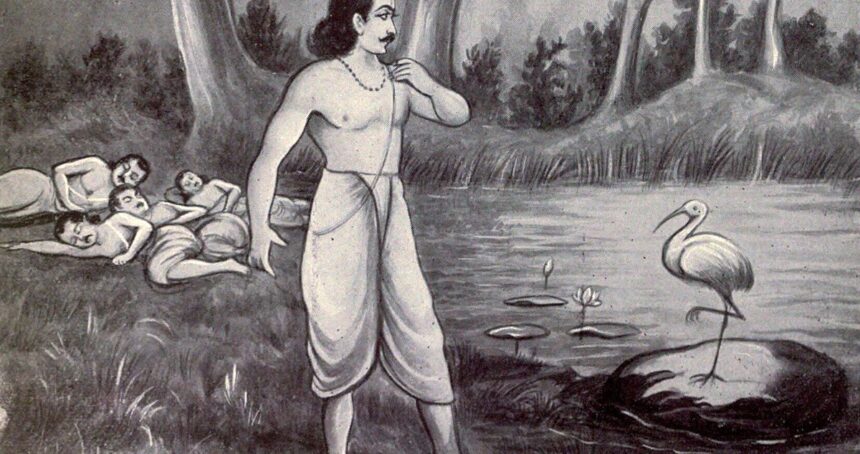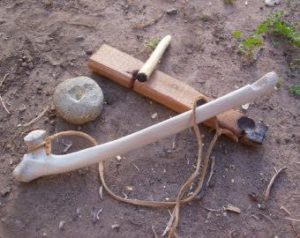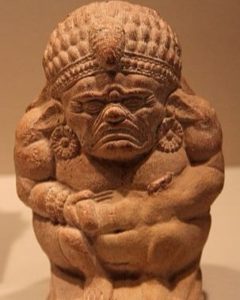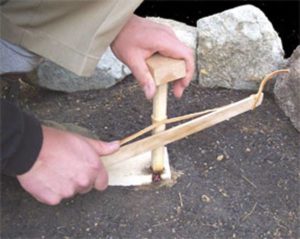The Pandavas' encounter with a Yaksha on the lake leads to a deep and profound discovery.
Yaksha’s Lake and the Fire Drill

As is well known, the five Pandavas brothers were exiled for a 12-year period, with one year of living in hiding, after they lost their kingdom in a gambling match with their cousins the ‘Kauravas’. At the time of this incident on the Yaksha Lake, they were nearing the end of their twelve-year exile in the forests & the year of Agyata Vaasa (living Incognito) was due to begin.
A Brahmin approached them for help one day in the midst of his fire sacrifices as part of his daily ritual and worship. One of the most essential tools needed in this practice was a device that could generate fire. It consisted of two wooden pieces, a rod (mathani) and a bow (arani), the arani helped the churning action of the rod, supported on a hollow, but firm base of stone or wood. Together they made a fire kit.

[Fire sacrifice tools from circa 2000-1800 BCE. National Museum India]
The Brahmin came to the Pandavas and begged for help. He had hung the fire-drilling sticks on a tree. A deer stopped by and rubbed its body on the trunk of that tree and the sticks got entangled in the antlers of the stag. It pulled and struggled in vain to rid itself of the unwanted burden; and the more it shook its head, the more firmly the fire-sticks got caught in its antlers. The deer fled away with them and hence Brahmin wanted the Pandavas to find the animal and recover his precious sticks.

[Bow drill fire kit of the Aztecs]
The Pandavas believed that it was the duty of Kshatriyas to help and protect the righteous. They immediately left in pursuit of the stag. They soon caught its sight but their attempts to stop the animal failed as they chased it all day but could not catch up with it. Not only did the quest fail, but they also ended up in the middle of the jungle, thirsty, tired and frustrated.
The Pandavas gave up the wild chase and stopped under the cool shade of a large tree. They cursed their bad luck and fretted over their failure at that relatively simple, uncomplicated task. Greater battles with their cousins lay ahead of them and yet they had not been able to help a Brahmin with a simple task.
The eldest Pandava, Yudhishthira, counselled his brothers and spoke about the balance of Karma. He said their misfortune and failure was a result of deeds in their past births. He instructed Nakula to climb a tree and locate a source of water so that they could quench their thirst. Soon Nakula informed Yudhishthira that there was indeed a cluster of trees not too far away from where cries of water cranes could be heard clearly. Yudhishthira requested Nakula to fetch some water in a quiver.
Nakula thus ventured out to fetch water and found a beautiful lake. The lake was devoid of any living creature except a crane (Vaka). When he attempted to take water from the lake, the crane spoke,
“O Nakula! The water of this lake will turn into poison if you take it without satisfactorily answering my questions.”
Nakula, in his arrogance, did not pay heed and hurriedly took some water from the lake. Upon drinking the crystal clear water, he instantly died of poisoning.
When Nakula did not return in the expected time, Yudhishthira suggested that Sahadeva go take a look at what had delayed him. Sahadeva reached the lake and was surprised to see Nakula seemingly asleep. He thought of quenching his thirst, before waking Nakula. He heard the same warning of the crane, ignored it and upon attempting to drink the water, also fell dead.
Then came Arjuna’s turn to find what had happened, he left worried carrying the famous Gandiva bow in his hand. He was stunned to see his brothers lying dead. He moved towards the water and heard the same warning. Unlike his two brothers, Arjuna did not ignore the warning, instead, he challenged the invisible source of the voice to show its real form and shot several arrows towards it. Arjuna challenged the voice, “Stop me if you can,” He proceeded to drink the water and fell dead beside his brothers. Soon Bhima suffered the same fate.

[Yudhisthira laments the demise of his brothers]
Since none of the brothers had returned with the water, Yudhisthira followed them. He came across the lake and found his brothers lying dead. Yudhishthira sat beside them and lamented. All his hopes were shattered. He had lost the kingdom and his brothers too. How would he ever be able to recover his lost kingdom without the help of his able, powerful brothers?
After a while, he began to look around to determine the reason for the deaths. He wondered there were no signs of struggle, was it some supernatural being that killed his indomitable brothers?
He again wondered if Duryodhana had the pool poisoned. He ruled it out because the faces of the dead brothers looked calm and serene. Convincing himself that it must have been some supernatural being, he approached the water’s edge to fetch some water to begin the last rites for his brothers. The voice was heard again.
“I am an alga and fish eating crane, your brothers’ sprits are in my control. You shall be the fifth victim if you do not answer my questions.”
Yudhisthira realised that the crane held the answer to the unfortunate turn of events. The virtuous Yudhisthira promised to answer the crane’s questions but requested it to reveal its true identity. He knew an ordinary being could not have killed his mighty brothers. The crane transformed to an ugly looking Yaksha, Yudhishthira saw a massive body with grotesque eyes that shone like the sun, and a voice like thunder:
“I warned your brothers. But they would not listen to me. So now they are dead. This pool belongs to me and unless you answer my questions you shall not touch the water.”

[Yaksha (Gnomes)- the keepers of water resources]
In the Mahabharata, the Yaksha asked eighteen questions in all with philosophical and metaphysical ramifications. A few are included here.
Yaksha: What makes scholars divine, honourable, humane or immoral?
Yudhisthira: The self-actualisation (Swadhyaya) along the guidelines of the Vedas is divinity for a scholar. Penance is a scholar’s honour. Death is the humane quality of a scholar. Criticising others is immoral.
(Only if a scholar is truly devoted to learning and is willing to forego all pleasures is he a true scholar. He should refrain from criticising and obstructing others from learning.)
Yaksha: What makes soldiers divine, honourable, humane or immoral?
Yudhisthira: The prayer is the divinity of a soldier. Archery or weaponry is the soldier’s honour. Fear is his humane quality. Abandoning people under his protection is immoral.
(A soldier devoting his undivided attention to his skill is divine, praying is his virtue, fear makes him human and he fails his duty if he doesn’t protect those who come take refuge.)
Yaksha: What is heavier than earth, higher than heavens, faster than the wind and more numerous than straws?
Yudhishthira: Mother’s sacrifice is heavier than the earth; a father’s contribution is higher than the heavens. The mind is faster than wind and our worries are more numerous than straws.
(We need to be thankful for our body to our mother and our upbringing to the father, the mind needs to be tamed for positive activities and worries need to be weeded out for thoughts to grow well.)
Yaksha: Who is the friend of a traveller? Who is the friend of the householder? Who is the friend of the ill and the dying?
Yudhishthira: The friend of a traveller is his companion. Wife is the friend of the householder. The Doctor is the friend of one who is sick and a dying man’s friend is charity.
(Only a co traveller can understand the problems of a foreigner in a strange land. A man’s wife can only care for his complete well being, physical, financial or religious. A doctor can help the sick and the dying has only the charity to bank upon.)
Yaksha: What is that when renounced makes one lovable? Losing what, can one be free of sorrow. What is that when renounced makes one happy and wealthy?
Yudhishthira: Pride, if renounced makes one lovable; by losing anger one is free of all sorrows. The absence of desire makes one wealthy; and to renounce greed is to obtain happiness.
(Ego obstructs us from loving those around us; anger separates us from dear ones and gives us sorrow. Satisfaction makes us feel rich and freedom from greed makes us truly happy. All these vices need to be renounced for harmony.)
Yudhishthira thus answered all the questions to the Yaksha’s satisfaction. Then the Yaksha allowed him to rejuvenate one of his dead brothers. Yudhishthira opted for Nakula. The surprised Yaksha asked him,
“Oh king, why did you choose Nakula, when you could have chosen the glorious Bheema and Arjuna?”
Yudhishthira replied,
“I am alive and so my mother Kunthi has one son. My step-mother Madri also deserves to have a son living.”
In the end, the Yaksha revealed himself to be Yama-Dharma, the god of death, who was none other than Yudhistira’s father. He blessed Yudhishthira that he was righteous and deserved to be the Kuru heir. He blessed him, saying since he had adhered to righteousness, the Gods shall protect them. Nobody will recognise them during the Agyata Vaasa (living Incognito).
He confessed to Yudhistira that in order to test them, he had stolen the Arani in the disguise of the deer. He returned the fire kit of the Brahmin.

[Operation of a fire drill]
The bow drill that the Brahmin came asking for is still used even after 7000 years since the end of the Mahabharata war. It is used as camp equipment and a survival kit for people living in the woods.

[A modern camper lights a fire with the drill fire kit]
The bow drill evolved from an ancient form of the drilling tool. It was also used to make fire and in this function, it also was called a fire drill. Bow drills were used in ancient Egypt and Mehrangarh (Pre Indus valley city in modern-day Pakistan) between the 4th and 5thmillennium BCE. The drill offers an ancient method of starting a fire without matches or a lighter, a method that applies friction to generate heat. The heat eventually produces an ember in the burnt sawdust.

[A spark or ember in the fire kit]

Leave a Reply